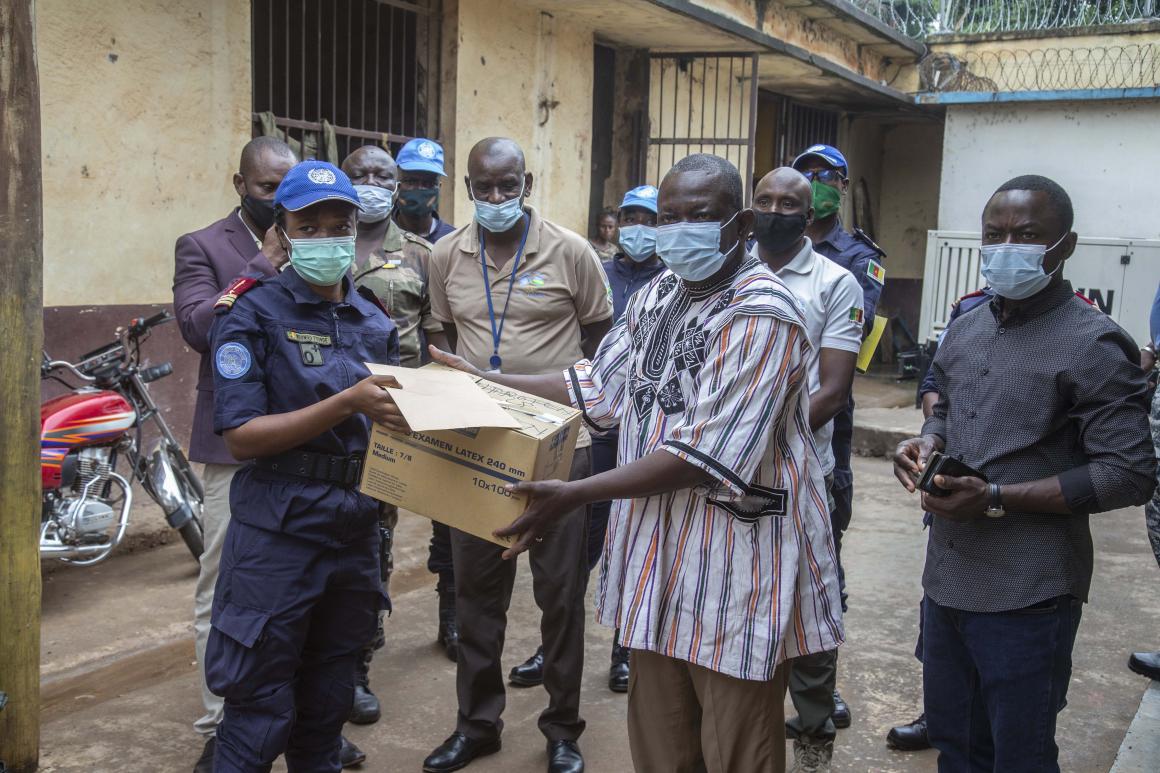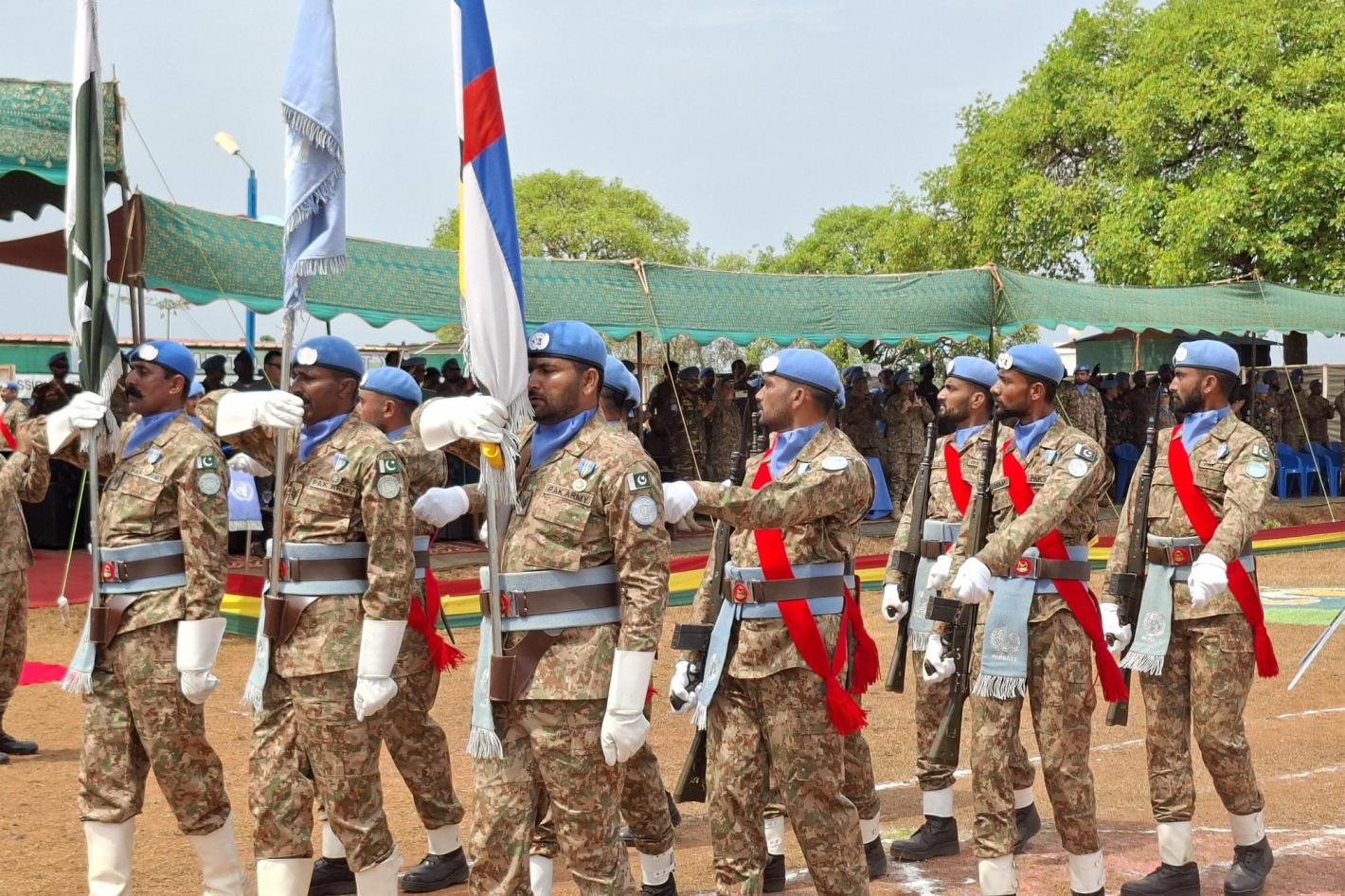The donation from the MINUSCA Cameroonian Formed Police Unit to the infirmary of the Ngaragba central men’s prison in Bangui, Central African Republic (CAR) might not have looked like much, but when the prison’s head nurse started to speak, it quickly became apparent that the seemingly modest 14 boxes of medicines and equipment were cause for celebration.
Standing in a corner of the somber infirmary, a pensive Jacky Maurel Gbadja began by quoting Nelson Mandela in a clear, earnest voice. “It is said that no one truly knows a nation until one has been inside its jails.”
“The reality here is clear for all to see,” he continued. “We are battling all kinds of diseases. We have no laboratory. We have no tap water. We have no electricity. Look at the cabinets! There are no computers to store data and ensure professional secrecy.”
And with a hint of what could have been agony, perhaps despair in his voice, he added: “We have no doctors to support the sole qualified nurse on site. We have seriously ill patients and we are struggling to find the means to save them.”
Community outreach by UN police peacekeepers
The Ngaragba jail is the CAR’s largest prison. The institution currently houses about 1,200 inmates. It is not difficult to see that the prison infirmary is in dire straits – at least judging by its barely-there, cramped observation room.
For the second Cameroonian Formed Police Unit (CAM FPU2) deployed to Bangui’s 1st and 7th districts since September 2020, the donation is part of community outreach activities regularly carried out by United Nations Police (UNPol) peacekeepers. The FPU is one of MINUSCA’s 11 formed police units, including others from Egypt, Congo-Brazzaville, Indonesia, Mauritania, Rwanda and Senegal. In addition to the protection of civilians, such as through patrols and supporting the Central African Internal Security Forces (FSI), police peacekeepers conduct similar activities for the benefit of the local population across the country, including free medical consultations, water distribution, donation of food and non-food items, etc.
Need for more partnerships
The donation – comprising medication, intravenous fluids, glucose injections, examination gloves, hypodermic syringes and needles – helped reveal wider concerns. “At the moment, we have about a hundred confirmed cases of tuberculosis as well as suspected cases that have been placed in isolation. The prison has been completely forgotten by the national program against tuberculosis,” lamented nurse Jacky Gbadja. Nine out of 13 fatalities recorded at the prison last year were related to tuberculosis.

With neither prison ambulance nor motorcycle, medical evacuation is also problematic; as is chronic overcrowding.
For the director of penitentiary administration Dieudonné Mbolinanguera who was on hand to receive the donation, what ails the prison infirmary is a lack of partnerships. He thanked the institution’s current partners (MINUSCA, the International Committee of the Red Cross and the non-governmental organization Fracarita) for their vital support while stressing the crucial role of cooperation in the management of CAR penal institutions under the government’s policy on penal reform based on the respect for human rights.
The Mandela Rules
The United Nations Standard Minimum Rules for the Treatment of Prisoners, also known as the “Nelson Mandela Rules” since 2015, serve as universal guidelines for protecting the rights of persons deprived of their liberty.
The Mandela Rules highlight that the provision of health care for prisoners is a State responsibility and oblige prison health services to cater for the physical and mental health of prisoners, including those with special needs.
According to the MINUSCA Justice and Corrections Officer Tchinro Ye, a core element of the Mission’s support to Central African penal institutions is the social reintegration of detainees – part of the global strategy of demilitarization of prisons. “It is practically impossible to implement the policy of reintegration when prisoners are not in good health,” he noted.
Ensuring prisoners’ health rights
The chief medical officer of the Cameroonian FPU, Captain Ndongo Tounde, expressed hope that their “modest contribution”, including a stock of anti-malaria drugs, disinfectant and painkillers would benefit the inmates.
Beyond helping “to fill existing gaps”, administration director Dieudonné Mbolinanguera acknowledged that the donation had shed light on “the reality of health challenges in prisons in the Central African Republic”.
He called on other actors to emulate the generous act of the Cameroonian UN police peacekeepers, to help ensure prisoners’ health rights in the Central African Republic.






